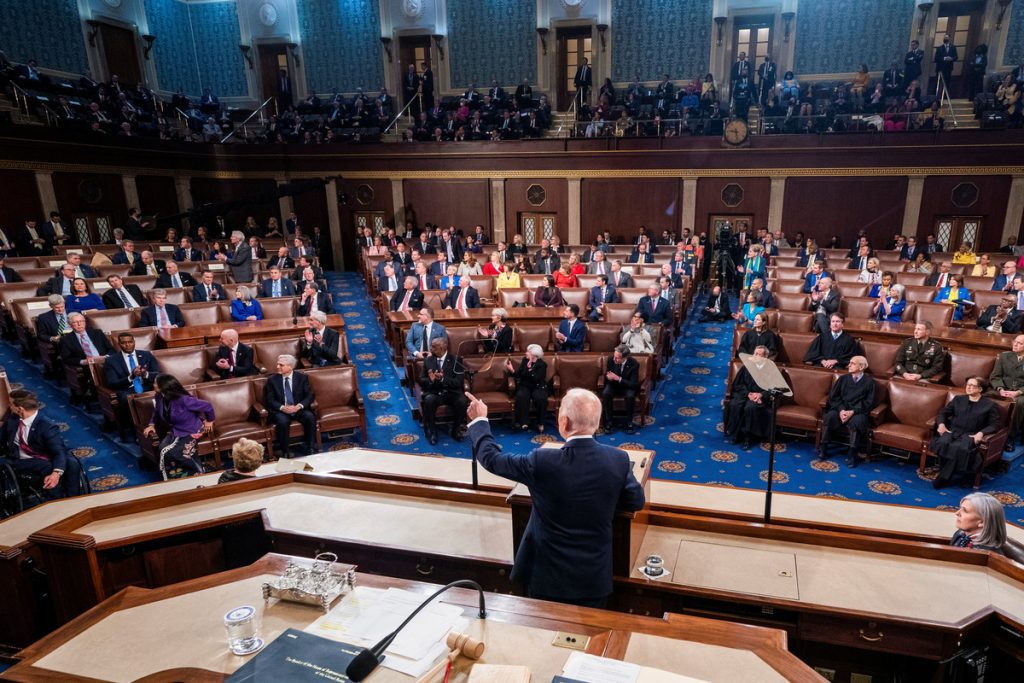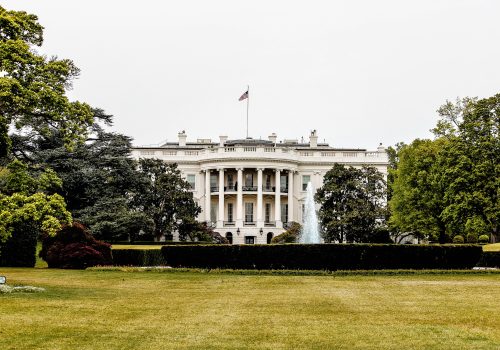Get ready for a divided government on a knife’s edge. Following the midterm elections, Democrats will hold onto the Senate with at most fifty-one seats, while Republicans will hold a narrow House majority—an outcome that was called by the Associated Press on Wednesday, more than a week after the election.
US President Joe Biden’s party had a strong showing, but the second two years of his term will likely look markedly different from the first two with Republicans controlling the House. What will become of US aid to Ukraine? Will there be a new approach to homeland security and foreign relations? What should we expect from forthcoming fights over appropriations and the debt ceiling? Will there be unlikely areas of cooperation?
Experts from across the Atlantic Council weighed in with their views.
Click below to jump to an expert reaction
Ukraine aid will keep flowing
Counter to previous expectations, the outcome of the midterm elections does not portend a change in US policy towards Ukraine. Prior to the vote, some analysts predicted that a strong Republican victory with populist candidates in the vanguard would strengthen the hand of those who want to sharply decrease US assistance to Ukraine. While it was never certain that such an election result would have led to those consequences, it appears that the Republican wave never materialized. While the Republicans will hold the majority in the House in January, it will not be a large one; and the Democrats held the Senate. Another factor is the underperformance of the populist or Donald Trump wing of the party; this suggests that their influence in Congress—and possibly against aid to Ukraine—will not increase. Bottom line? Strong support for Ukraine will continue. The outgoing Congress will likely ensure adequate funding for Ukraine through 2023 during the lame-duck session; and the incoming Congress is also likely to maintain that support.
—John Herbst is the senior director of the Eurasia Center and a former US ambassador to Ukraine.
There’s a fight brewing over the debt limit. Here’s what to watch.
The shift of a few seats in the House could have major real-world global economic repercussions. The most pressing challenge is finding a way to raise the debt ceiling. According to Treasury Secretary Janet Yellen, the United States may reach its limit as soon as the summer of 2023. If the debt ceiling isn’t raised before then, the consequences could be credit downgrades, spiraling interest rates, and shocks in the stock market. Of course, both parties know this, and no one wants to increase pain during an economic slowdown. Instead, a looming default can be used as negotiating leverage on other priorities such as spending cuts. The question is: Will Congress play chicken with the debt limit amid the possibility of a global economic recession? The world will be carefully watching this fight play out over the coming months and hoping cooler heads prevail. One thing to watch out for is an effort by Democrats to pre-empt the battle by raising the debt limit during a lame-duck session before the new Congress is sworn in. Biden may be hoping that they can push the issue past the 2024 election. Markets would breathe a sigh of relief, but there are only a few weeks to pull it off and complicated legislative maneuvers to make it work.
No matter what the final count looks like, the new Congress will be focused on the Federal Reserve. Both parties have given Chairman Jay Powell a fair amount of deference during the pandemic. He was confirmed to a second term just last year. But if inflation stays high or the United States enters a recession, expect tougher hearings and sharper questions directed at the Fed. That may be one rare issue of bipartisan consensus in the new Congress.
—Josh Lipsky is senior director of the GeoEconomics Center and a former International Monetary Fund advisor.
One area for bipartisan hope: Energy-permitting reform
As Congress tilts right, hope remains that new House leadership may actually help to stimulate permitting reform that would further anchor the United States’ status as a major conventional and, increasingly, clean energy superpower. Admittedly, the energy and climate setting that the members of the 118th Congress will inherit in 2023 is bleak. Induced by a pernicious mix of post-pandemic economic pain and Russia’s war in Ukraine, short-term energy market volatility has the world on edge, frustrating an already dire outlook for global efforts to limit warming to 1.5 degrees Celsius. The magnitude of these challenges, however, may be cause for political optimism. After all, there is precedent for energy and climate compromise despite political division between the executive and legislative branches in Washington.
Nearly seven years ago, the Obama administration enabled Republicans to repeal the forty-year-old ban on exporting US crude oil in exchange for extensive renewable energy tax incentives. The conditions prompting progress in 2015 pale in comparison to the alarming outlook today, and the White House and Congress have motivation to act. Without permitting reform, Biden’s signature energy and climate legislation—the Inflation Reduction Act—will fail to achieve its full potential. The same web of environmental reviews constraining construction of oil and gas pipelines and associated infrastructure is hindering development of clean energy infrastructure critical to decarbonizing the world economy.
In this manner, Republicans may be a surprising key to climate progress. Driven by a renewed focus in Western capitals on reducing reliance on Russian and the Organization of the Petroleum Exporting Countries (OPEC) energy supply, Republicans are likely to see the merit in accelerating permitting reform that has previously been stopped by the progressive wing of the Democratic Party. Political posturing, of course, can frustrate reforms, especially as attention shifts to the 2024 presidential election, but the stakes are high for ensuring the United States retains its position as a reliable supplier to the global market in the face of Russian aggression. Accordingly, look for permitting reform to gain renewed attention in the next Congress—and potentially in the lame-duck session.
—Landon Derentz is the senior director of the Global Energy Center and a former director for African and Middle Eastern affairs in the US Department of Energy.
For NATO and Europe, a sigh of relief
Nervous European allies wondering if the US midterms would return a wave of Donald Trump-inspired, NATO-wary members of Congress are likely heartened by the results of the election. While national security was not directly on the agenda in these local races, recent threats that a Republican congressional majority would curtail aid to Ukraine stoked concerns in Brussels and beyond that a decisive Republican showing would be a harbinger of the kind of turbulence for transatlantic security seen during the Trump years. This concern was pronounced enough that senior European officials traveled to Washington before election day seeking insights about how to navigate such a dynamic.
Given the razor-thin Republican majority in the House and a closely divided Senate where support for Ukraine remains strong across the aisle, it seems that worse-case scenarios have been avoided for proponents of NATO and Ukraine. And the fact that recent polling shows American voters still strongly supportive of US aid to Ukraine is another encouraging indicator that the Kremlin-curious crowd lacks any broad-based support. Europeans will also be encouraged that many election deniers were defeated, a sign of resilience for US democracy after the shame of January 6th and a boon for democratic institutions such as NATO.
Of course, all these positives for NATO are counterbalanced by Trump’s announcement that he will run for president again, which is likely to come with a recirculation of his anti-NATO worldview during the course of his campaign.
—Christopher Skaluba is the director of the Transatlantic Security Initiative in the Scowcroft Center for Strategy and Security and a former principal director for European and NATO policy at the Pentagon.
Europe won’t be on the chopping block, but may face new pressure on defense and security
Over the past two years, repairing the relationship with Europe has been a mainstay of Biden’s broader foreign policy agenda. He’s let Germany off the hook in terms of defense spending, lauded European nations’ efforts to wean themselves off of Russian energy in the wake of Russia’s invasion of Ukraine, and even committed to permanently station US troops in Poland. To everyone’s surprise, the Donald Trump-inspired “MAGA” wing of the Republican Party was largely trounced in the midterms. Had that segment been more successful, it wouldn’t have surprised me to see the US-European relationship under greater strain with the Republicans in control of the House.
Instead, with Republicans’ narrow House margin and Democrats controlling the Senate, I think Congress will have bigger fish to fry (focusing on domestic issues such as the economy, and even infighting within the Republican Party), so Europe won’t be on the chopping block the way it was during Trump’s presidency. It will still be important, however, to watch the trade and competition space—especially with regard to the Inflation Reduction Act and the accusations of protectionism being levied by Europe. As the war in Ukraine grinds on, we also might see more criticism from Capitol Hill accusing Europe of failing to pull its weight on defense and security. To “future proof” the relationship, it is imperative that Europe continue to step up to the plate and play a more forward-leaning role as a global power.
—Rachel Rizzo is a nonresident senior fellow at the Europe Center.
Republicans will challenge Biden’s China policies—starting with export controls
House Republicans will use their new majority to target a number of critical issues associated with the US-China relationship. Expect an initial focus on technology competition, supply-chain resilience, and a very close examination of the overall efficacy of US export controls.
Many Republicans see the recent export restrictions placed on China’s largest semiconductor manufacturing companies as a continuation of the “whack-a-mole” approach to export controls. To help identify new approaches to this decades-old technology and national security challenge, the House Foreign Affairs Committee will start a ninety-day review of the Bureau of Industry and Security’s (BIS) handling of export controls. As part of this investigation, a particular emphasis will likely be placed on examining the export-approval process, with many Republicans highlighting that BIS approved the export of over $61 billion of US semiconductor technology to companies on the export blacklist in 2021 alone.
Pending the results of the ninety-day review, a Republican-led House could propose significant new changes to existing export control legislation. Ideas currently being floated include bureaucratically empowering BIS by separating the office from the Commerce Department and creating a direct reporting chain to the president (similar to the Office of the United States Trade Representative), creating a new intelligence office within BIS to more efficiently act on classified information, and expanding end-use controls on emerging and foundational technologies.
Overall, a Republican-led House will view US-China technology competition as a key priority, and policy watchers should expect the introduction of new legislation that will have a significant impact on research security, trade, and supply-chain resilience.
—Kit Conklin is a nonresident senior fellow at the GeoTech Center and former US national-security official.
The new Congress won’t change Biden’s course on Iran
Foreign policy, particularly toward Ukraine and the Middle East, has been fairly bipartisan in Biden’s first two years. Given that the “red wave” was barely a dribble, I don’t expect much impact on US foreign policy toward either. Congress will still not be in position to block an Iran nuclear deal, should one ever materialize, or to force additional sanctions on an administration that is already being proactive in support of Iranian protesters and in opposition to Iran’s provision of drones and missiles to Ukraine.
However, expect House Republicans to amplify the expected hawkish views of Benjamin Netanyahu, newly returned as Israeli prime minister. For Netanyahu, Iran remains a useful foil and way to deflect attention from Israeli-Palestinian tensions and US criticism over Israeli treatment of the Palestinians and Israeli Arabs.
—Barbara Slavin is the director of the Future of Iran Initiative.
While the Senate stays the course, House Republicans may force Biden’s hand on Venezuela and Central America
With Democrats retaining control of the Senate, a top priority must be quick approval of the remaining US ambassador-designees for posts in Latin America and the Caribbean and the multilateral institutions focused on the region: the Inter-American Development Bank and the Organization of American States. China has its diplomats in place in countries across the Americas, so should the United States. Senate holds on US ambassadors only serve to undermine US influence and policy.
The change in leadership in the House of Representatives, albeit by slim margins, will likely result in new pressure points for the Biden administration with regard to two key policy areas: Venezuela and Central America. In Venezuela, President Nicolás Maduro’s jumping on to the world stage at the United Nations Climate Change Conference of the Parties (COP27) last week reflects a new confidence by Maduro and a new acceptance of his administration by a growing number of countries around the world, including new leaders in Latin America. Following the release of US hostages, and as preparations continue for a return to the Mexico City negotiations between the Maduro government and opposition leaders, momentum may be building for a re-evaluation of what is the most effective US policy to advance political freedom and human rights. But with Republicans taking control of the House, and with eyes on Florida and the 2024 presidential election, expect hearings and legislation to seek to handcuff any potential easing of the more hard-line policy toward Venezuela. Although any potential legislation passed in the House will be dead on arrival in a Democrat-controlled Senate.
The new House will also advance numerous inquiries into US immigration policy, including calling for investigations into actions taken at the Department of Homeland Security. These moves will put a new laser focus on the Biden administration’s policies in Central America that have sought to advance short and long-term solutions to decrease migration from these countries. Those include diplomatic efforts such as the Los Angeles Declaration on Migration and Protection put forward at the Summit of the Americas in June. Hearings and investigations will focus on DHS but will draw in the administration’s broader policy priorities in Central America.
Most important is that policy toward Latin America and the Caribbean be bipartisan in its goals and actions. With China’s growing presence and influence in the region, any increase in partisan division on Latin America and Caribbean policy will only harm long-term US interests.
—Jason Marczak is the senior director of the Adrienne Arsht Latin America Center.
Republicans may agree with Biden on trade policy
A Republican-run House will argue that the United States’ past policy toward developing countries based on financial aid and trade preferences should be replaced by a policy promoting economic partnerships. It will insist that US policies abroad must result in clear benefits for Americans.
Financial aid to developing countries is often delivered through international governmental and non-governmental organizations that are themselves a problem. Some have been co-opted by China and other malicious actors. Others pursue their own goals rather than helping recipient countries. And many government aid recipients are corrupt.
Republicans are likely to insist that future aid be delivered through civil-society partners such as corporations, business associations, and faith-based organizations.
US policy has traditionally assumed that trade deals open foreign markets for US exports and thereby increase domestic prosperity, while other countries will become more democratic through trade with the United States, which in turn leads to peace in the world. But the economic globalization of recent decades has led to manufacturing job losses that have impoverished many Americans, and neither communist China nor dictatorial Russia has become more democratic or more peaceful.
Republicans will argue that preferential trade deals should remain an option but be used selectively. Instead, they are likely to promote economic partnerships with benefits for other countries but also very clearly for the people of the United States—partnerships in which the private sector has a key role. Republicans and Democrats are likely to find common ground in this area as neither the Trump nor the Biden administration has been enthusiastic about new preferential trade deals.
One partnership example is friend-shoring, moving US corporate supply chains from increasingly adversarial China to friendly countries that offer economic incentives to US companies. Another is the Biden administration’s recently signed Indo-Pacific Economic Framework for Prosperity, which brings together twelve countries representing 40 percent of world gross domestic product. No US aid or preferential trade access to the US market is involved. Instead, the agreement establishes fair rules and business standards for key sectors of the world economy, for the benefit of all.
—Dan Negrea is the senior director of the Freedom and Prosperity Center and a former special representative for commercial and business affairs at the US State Department.
The lame-duck session could be an opening to improve congressional oversight of homeland security
The dust is still settling on control of the new Congress, but the implications will be considerable for the homeland security enterprise—keeping the United States safe from non-military threats ranging involving cybersecurity, borders and immigration, domestic terrorism, climate change, and more. Just as important as which party controls which house of Congress is who will chair the eleven key congressional committees in the House and nine committees in the Senate that have authority over all or part of the Department of Homeland Security (DHS). These numbers alone show the high hurdle that the Congress faces in trying to address problems at DHS.
If Congress wants to be effective, there are steps that the leaders in each house can take that need to be decided before the 118th Congress convenes in early January. Both the House and the Senate control committee jurisdiction by rules that are adopted at the start of each congressional session. On the House side, the speaker should re-affirm the memorandum of understanding that applied during the 117th Congress: that other House authorizing committees need to coordinate with the Committee on Homeland Security over any DHS-related authorizing legislation. On the Senate side, the majority leader should consider dividing up the Homeland Security and Governmental Affairs Committee into two separate committees. This would mirror the approach in the House. Oversight of DHS and conducting investigations are important, separate missions that require dedicated focus.
—Thomas Warrick is a nonresident senior fellow at the Scowcroft Center for Strategy and Security’s Forward Defense practice and a former deputy assistant secretary for counterterrorism policy at the US Department of Homeland Security.
Further reading
Thu, Nov 3, 2022
Will next week’s midterm elections impact US support for Ukraine?
UkraineAlert By Peter Dickinson
US backing for Ukraine has been crucial for the country's fight back against Putin's invasion but the campaign leading up to next week's US midterm elections suggests American support cannot be taken for granted.
Wed, Nov 2, 2022
US midterm elections, Part I: What’s at stake for energy and climate?
EnergySource By David L. Goldwyn, Andrea Clabough
The US midterm elections could alter the course of the Biden administration's energy and climate trajectory. But just like points of contention could emerge, consensus and continuity could as well.
Thu, Nov 3, 2022
US midterm elections, Part II: The executive agenda and leading from the top
EnergySource By David L. Goldwyn, Andrea Clabough
Even if the Biden administration has to work with a divided government after the midterms, it will retain significant control of energy and climate policy after having already passed major legislative packages. However, it will still be up against the clock to implement additional measures and protect them from future reversal.
Image: U.S. President Joe Biden delivers his State of the Union address at the U.S. Capitol in Washington, DC, U.S., March 1, 2022. Shawn Thew/Pool via REUTERS



